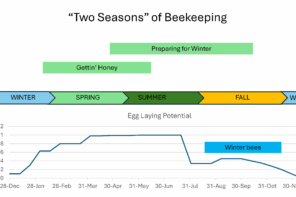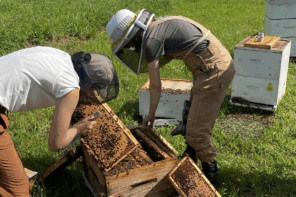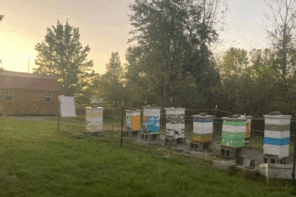Jury Duty
Ed Colby
I heard through the grapevine about a commercial beekeeper who lost an almond contract when someone insinuated that his bees must surely be riddled with Varroa mites, simply because he stopped using amitraz to kill mites.
This is wrong on at least three levels. First, it violates the first beekeeper commandment: Thou shalt not backstab thy fellow beekeeper.
Second, I have it on good authority that this commercial guy is an excellent beekeeper who lives and breathes mite control.
Third, amitraz is losing its efficacy, due to overuse and failure to alternate its application with other mite control measures. Like Covid-19 variants that mutate to become more contagious to humans and resistant to vaccines, mites are learning to live with amitraz. Some unimaginative beekeepers are keeping Varroa at bay with repeated amitaz treatments and nothing else. I’ve heard tales of treating ten times in a year. How long can this continue, before amitraz goes the way of Apistan and Checkmite, and mites become completely resistant?
In the past, if you treated with amitraz, you could scarcely find a mite afterwards. Now there appear to be reservoirs of resistance. When I do post-treatment sugar-shake mite counts, I find that amitraz kills most mites in most – but not all – colonies.
My jury summons came just before Christmas. It was an honor to serve. I did have to interrupt the trial on three occasions, because my hearing is shot, and sometimes folks don’t get close enough to the mic. During the juror interview, when I told the public defender I was a beekeeper, he said his wife wanted to keep bees. After the trial I gave him my beekeeper card. I said his wife could call anytime. One of the other jurors wants to buy my honey.
We were 12 more-or-less random citizens. The judge told us we held a human being’s freedom in our hands. He was presumed innocent, until proven guilty. All this made me feel proud to be an American.
The defendant had a rap sheet and was clearly no angel, but that didn’t make him guilty as charged. After listening to the testimony, I suspected he committed the crime of driving under the influence of drugs but nonetheless harbored reasonable doubt.
When we the jury retired to render a verdict, I anticipated some back-and-forth. What I encountered instead was unanimous agreement that the state had failed to prove its case. We found the accused not guilty in less than five minutes. We ranged in age from 20 to 74. We were working people, retirees, a student. I’m confident we represented a continuum on the political spectrum. Yet we came together for three days, considered the evidence, and decided a man’s fate. I’m confident we made the right decision.
This makes me wonder why our elected leaders – hopefully men and women of goodwill – have such a hard time coming to consensus on how to promote the common good.
I did a re-do on my book – “A Beekeeper’s Life: Tales from the Bottom Board.” One of the stories had what I thought was a snappy ending. But two random sentences from an earlier version of the story got inexplicably pasted on, right after that snappy ending. I can’t explain this or how I missed it before. But writing is like beekeeping. You learn as you go. I learned long ago to never let Varroa mites have their way with my little darlings. In writing a book, I now understand that you need a trusted editor, because when you get too close to something, you inevitably lose your focus.
There is currently much buzz about top-ventilated versus non-top-ventilated overwintering hives. Do we want upward movement of air entering from a lower entrance, so that moisture escapes via a top entrance? Or is it better to close off the top of a necessarily well insulated hive, so that as moisture condenses it runs down the inside walls of the hive? (Not on top of the bees’ cluster!) This gives bees a water source and mimics the natural overwintering of feral colonies nested in tree hollows.
In my experience, non-insulated, top-ventilated hives with low mite counts can Winter pretty well here in west-central Colorado. I could tell you my success rate wintering top-ventilated colonies, since I began giving my bees a November or December oxalic acid dribble. But I don’t think I will. Jinxes are real, for me at least, and braggarts live to rue their pride. I believe in sound beekeeping practices but also in luck.
Well insulated, non-top-ventilated hives with low mite counts also might work. I said might.
It’s January as I write and snowing like the good old days. In a blizzard the other day, my sidekick Marilyn struck up a conversation with some poor waif at a lonely roadside bus stop. This poor child was trying to get to Oregon, but she had to go to Denver first, because her life was complicated. Her traveling-companion boyfriend abandoned her after he broke the stick shift on her truck. She left the truck at the Safeway parking lot. She was broke, with only a bus ticket and a to-go meal from Catholic Charities to sustain her. The bus was hours late, Vail Pass was closed, and this unfortunate told Marilyn she was afraid to go looking for a bathroom for fear the bus would show up while she was gone.
Good gal Marilyn drove her to the Amtrak station and bought her a train ticket. Later, I commended Marilyn for her spontaneous generosity. “You little darling! Any kindness begets yet more kindnesses that ripple through the universe. Love is all we have, all we ever had, isn’t it?”
“That’s it!” she said. She flashed her trademark Marilyn smile, and my heart swelled until it nearly burst.









